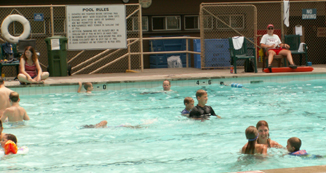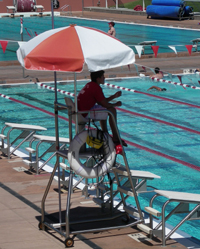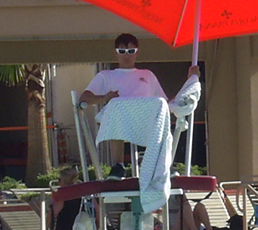Facilitate a discussion with participants (lifeguards during in-service training, or lifeguard candidates) by asking the following questions:
“Can your posture in the lifeguard stand affect how well you guard?”
Ask your class to slouch forward in their seats with their torso diagonal and legs out stretched.
Ask “what message are you sending out to people?”
Answers: Responses could include the following:
- I’m bored.
- I wish my shift was over.
- I wish the summer was over.
- I’m too cool for this job.
- These swimmers are so good they really don’t need me.
- Nothing ever happens at this pool.
“What would pool patrons think of a guard in this stance?”
Answers: Responses could include the following:
- pool patrons won’t think you are paying attention
- pool patrons won’t think you care about your work
- pool patrons won’t think they and their children are safe
- patrons don’t think they can take you seriously
- reinforces the notion some people have that guards are just immature teenagers doing a simple summer job, rather than professional rescuers
- they wonder why the manager or other guards won’t do something about this
“What would other guards on your team think of you?”
Answers: Responses could include the following:
- other guards won’t think you care
- other guards won’t think you are ready to act
- other guards will think you are overconfident
- other guards would think you can’t watch/aren’t watching all of your zone properly
- some might think you’re ‘cool’ just because you look so ‘confident’. For those who think about team work and doing a good job, your appearance may have detrimental effects.
“How do you feel about yourself like this?”
Answers: Responses could include the following:
- not alert
- not ready to respond in an emergency
- not confident
(If participants did not touch on this subject, mention it:
From a teenage guard’s point of view, some adults do not have a lot of respect for teenagers and this would make it worse.)
“Besides posture, what else can negatively affect how the public/other guards view you?”
Answers: Responses could include the following:
- not holding your rescue tube across your lap, for example using it as a footrest or sitting on it
- twirling your whistle
- unshaven face, unclean clothes
- vigorously chewing gum, especially blowing bubble gum bubbles
- tapping on the rescue tube as if it were a bongo drum
- tapping feet/nodding head to heard or unheard music
- dancing while on walking patrol
- playing with your hair
- not moving your head as you scan
- slurping a drink through a straw
- mirrored sunglasses that do not allow people to see your eyes when they talk with you
- talking to friends/other guards/passers-by (except as a part of lifeguarding duties)
- not rotating stations properly
“Do you think it would be easier to enforce rules if the pool patrons think all the guards are totally professional? Why?”
Answers: Responses could include the following:
- You get more respect.
- Patrons take you more seriously.
- You really are more ready to respond immediately.
“What other things can contribute to being professional?”
Answers: Responses could include the following:
(refer to the sections in the current lifeguard training manual about Characteristics of A Professional Lifeguard, Effective Scanning, INTERACTING PROFESSIONALLY WITH THE PUBLIC etc.).

See also photos such as these at Not Rescue Ready




Preventative Lifeguarding has notes from various staff manuals, personal experiences and the Red Cross texts.
It includes UNSAFE PRACTICES or potential problems TO WATCH FOR, areas where most accidents occur, accident prevention tips that USA Swimming coaches know and suggested disciplinary action for minor and major infractions.
Should lifeguards wear cowboy boots? is a quiz for lifeguards or lifeguard classes
——————————————————————-
The author of this webpage, (written as a reading assignment for my students), does not give any warranty, expressed or implied, nor assume any legal liability or responsibility for the accuracy, completeness, or usefulness of any information, product, or process included in this website or at websites linked to or from it. Users of information from this website assume all liability arising from such use.